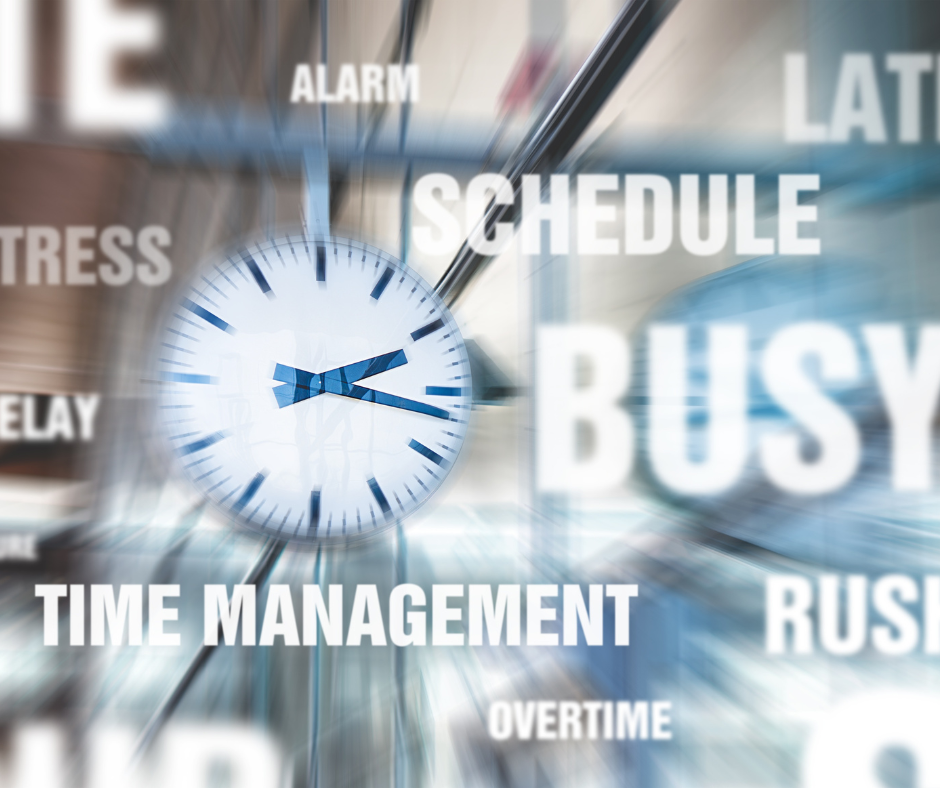Do you ever wonder why some accountants are good at managing their time while others struggle? Do you find yourself delaying tasks even when they’re important?
If time management is a problem, then this episode is for you. I specialize in time management for accountants and have discovered the secret to better time management.
One of my coaching clients recently said, “You should call yourself the ‘Get Sh*t Done Coach for Accountants’ because I’ve never known anyone who gets more done in less time without burning out than you.” I loved that so much that I’ve started calling myself exactly that – The Get Sh*t Done Coach for Accountants.
In my experience, here’s what I see with most accountants – they have what I call “time drama.” Time drama refers to the mental drama and stress related to how we think about and use our time.
Being aware of this is important because it can throw us off track without realizing it. Some common thoughts that create time drama include:
This is too difficult.
There’s too much to do.
There’s not enough time.
Tax season is overwhelming.
Everyone else is stressed about time.
There’s nothing I can do to fix it.
The interesting thing is that most accountants believe they’re not being dramatic; they genuinely think time is the problem.
Your brain’s role in time management
But here’s something important that nobody is teaching accountants about time management: Time itself isn’t the problem. The real issue lies in the way you think about time. In other words, it’s not time that’s causing the trouble, it’s your brain.
Thankfully, it is possible to find balance, create more time in your day, and accomplish more in less time by understanding your brain’s role in time management. What no one is teaching accountants is that you first have to learn how to manage your brain before you can better manage your time.
I promise you that improving time management for accountants isn’t just about learning a better process. It’s not about the latest technology, app, or special planner.
It’s about becoming a Smarter Accountant and understanding how your unique accountant brain works. Once you gain a better understanding of that, you’ll be amazed at how much more balance you’ll achieve and how much your time management will improve.
If you’re skeptical right now, I understand why you might hesitate to see time differently from other accountants. But that’s part of the problem.
Your brain looks for evidence to support what you believe. If you don’t challenge your beliefs, you’ll never experience what’s truly possible.
Believe me, I felt the same skepticism you’re feeling now. But once I understood the connection between our brains and time management, everything about my time management skills improved.
The same goes for my coaching clients. I’ll share some of their stories in a minute.
All those apps, planners, and programs you’ve been trying to improve your time management are just temporary fixes. The analogy I use is that relying on them is like using towels to catch water from a leaky faucet instead of fixing the leak itself. To solve the problem, you need to stop the leak.
The issue I often see with accountants is that we know how to put tasks on a calendar and schedule our time, but when we don’t know how to manage our brains, we can’t guarantee that we’ll follow through. We get pulled in different directions, time slips away, and suddenly our to-do list has grown with not enough hours in the day to complete everything.
So, if you’re an accountant struggling with time management, it’s not your fault. Most accountants are managing their time incorrectly, which has led to the belief that time is the problem. You can’t go to work every day thinking time is the problem and expect to gain control over it.
With this blame mentality, your time management will be sloppy. In other words, when you make time the problem, you create more problems for yourself.
The power of the prefrontal cortex
To improve your time management, it’s important to understand your brain better. One of the main reasons why you struggle with time management is that you’re not using the higher part of your brain called the prefrontal cortex enough.
In a previous episode, I explained that you have two main parts of your brain: the lower part, which I call the Toddler, and the higher part, which I refer to as the Supervising Parent. The Toddler seeks immediate gratification, while the Supervising Parent can make better decisions and delay gratification.
If time management is a problem for you, it means you’re not using the power of the prefrontal cortex, the Supervising Parent part of your brain, to manage the Toddler. In other words, you’re letting your unmanaged brain control what you do and don’t do, wasting a lot of time and energy in the process.
Unfortunately, many of us have unhelpful thoughts when it comes to our workload, time constraints, and other aspects of what needs to be done. And the worst part is that we often find other accountants who agree with us.
One of my coaching clients was surprised to discover how often she described herself as “busy” and how that affected her productivity. Once she learned to separate the facts from the story her brain was telling about the facts, she was able to accomplish much more in less time.
The great thing about becoming a Smarter Accountant is that you can master time management by understanding that managing your brain has to come first. The reason your life feels unbalanced and time management is a struggle is because of your unmanaged brain.
It’s important to know that the prefrontal cortex, the Supervising Parent, plays a key role in time management. It handles executive functions like planning, decision-making, and self-control. The prefrontal cortex helps us set goals, prioritize tasks, and plan our calendar.
The prefrontal cortex also helps us resist distractions and see the long-term benefits of focus. It enables us to resist the temptation to check social media or email when we need to concentrate on a task.
I’ll be discussing managing email in an upcoming episode, but for now, just know that not properly managing email is one of the biggest time wasters for accountants. When working with my time management clients, I teach them how to manage their email instead of letting email manage them.
You’d be amazed at how much more productive you can be when you use the prefrontal cortex to manage things like your email. It’s like having your own personal assistant.
When you learn to manage your brain and develop better habits with time, regular tasks become easier without requiring too much mental effort. Creating good time management habits makes your daily routines more efficient, leaving more mental energy available for more demanding accounting work.
The effect of stress on time management
Another reason why your brain affects your time management is that if you don’t learn to be aware of and manage your emotions, you’ll constantly feel stressed and overwhelmed. And do you know what doesn’t help you to be productive and efficient? Feeling stressed and overwhelmed.
When we’re stressed and overwhelmed, it becomes difficult to concentrate and make decisions. You’ve probably experienced this as well, where it seems almost impossible to get anything done because you’re feeling so overwhelmed.
But here’s the good news: when you learn a simple process for managing your brain, you can shift from feeling stressed and overwhelmed to feeling focused and clear. What I like to tell my coaching clients is that the feeling of stress is like trying to drive at high speed with the parking brake on—it’s impossible to make progress without burning out.
Once you learn to handle stress better, you’ll be amazed at how much more you can accomplish in less time. Stress and overwhelm are also terrible motivators, which is why many accountants struggle to avoid overworking.
The brain’s reward system
Another thing that’s important to know is that your brain’s reward system plays a role in time management. This system releases chemicals like dopamine, which makes us feel good and motivates us to repeat certain behaviors. When we accomplish a task or achieve a goal, dopamine is released, giving us a sense of pleasure.
However, the reward system can work against us when it comes to managing our time. Tasks that provide immediate gratification, like checking social media or email, can activate the reward system and make it hard to focus on more important tasks that have delayed rewards.
That’s why we often get distracted by email notifications or social media alerts, even when we know we should be working on something else. Our lower, “Toddler” brain is driven by seeking pleasure, avoiding pain, and conserving energy, which is why these distractions are so tempting, especially when doing accounting work.
To the Toddler part of our brain, accounting work is not usually seen as pleasurable, it can be challenging, and it requires a lot of mental energy. So, it’s no wonder we easily get sidetracked by the immediate gratification of things like email.
It’s also important to know that external factors like societal expectations or work environment can influence how our brain rewards us. For example, if there’s pressure to work long hours or complete difficult tasks within tight deadlines, our brain’s reward system might kick in when we meet those expectations, even if it’s not beneficial for our overall well-being.
Resolving cognitive dissonance
This can often lead to a sense of dissonance or discomfort between our internal sense of what is rewarding and our external behaviors. Dissonance refers to a state of conflict or inconsistency between our beliefs and our behavior.
Cognitive dissonance is like a game of tug-of-war in our brain. It’s when we experience mental stress when confronted with information that contradicts our existing beliefs or values.
For example, let’s say you really value your personal time and want a good work-life balance. But at the same time, you feel pressured to meet strict deadlines and work long hours. This creates a conflict in your mind because your beliefs clash with what’s expected of you.
As a result, you might feel stressed and under pressure as you try to balance your personal life with work demands. It can be tough to handle the guilt or internal conflict that arises when you have to work extra hours and sacrifice your personal time.
The good news is that understanding how your accountant brain works can help you resolve this conflict. It can help you find a balance between your personal priorities and your professional responsibilities.
By learning how to manage your brain effectively, tasks like setting realistic deadlines, delegating work, and communicating with your colleagues and clients become much easier.
The benefits of becoming a Smarter Accountant
I’ve shared a lot of information about how your brain affects your time management skills, but personally, once I learned how to become a Smarter Accountant, everything improved. I got better at managing my time, accomplishing more in less time, reducing stress, and having a balanced life.
Most people call it “Time Management,” but I prefer to call it “Time Mastery.” To master your time, you need to do two things: learn how to manage your brain and learn a better process to manage your time.
That’s exactly what I teach in the 6-week Smarter Accountant Time Mastery Program. You’ll learn how to manage your brain effectively so that you can more effectively manage your time. The truth is, as accountants we struggle with time management when we don’t address both aspects.
The good news is that my clients are amazed at how much more they can achieve in less time without burning out. Thankfully, mastering time is a real game-changer.
For example, one of my clients, Jay, often found himself overwhelmed and struggling to manage his time effectively. He would frequently get caught up in minor tasks, allowing them to eat away at his precious working hours.
Procrastination and poor prioritization resulted in missed deadlines and increased stress levels. Jay’s productivity suffered, and he often had to work late nights and weekends to catch up, leading to burnout and a diminished quality of life.
Once he successfully completed the 6-week Smarter Accountant Time Mastery Program, he learned valuable techniques and strategies to optimize his time management skills. With new found clarity and focus, he became a master at prioritizing his tasks. By eliminating distractions and setting clear goals, Jay discovered a newfound sense of purpose and direction in his work.
With the help of my exclusive Container Calendaring process and learning how to manage his brain so that he didn’t feel stressed or overwhelmed, he improved his productivity exponentially. By effectively managing his time, he was able to accomplish more in a single day than he previously achieved in a week.
Deadlines were consistently met, and the quality of his work improved significantly. He no longer had to sacrifice his personal life to meet work demands.
Remember, the problem isn’t time itself; it’s your unmanaged brain.
Okay, that’s what I have for you today. Make sure you tune in next week when I discuss the brain-productivity connection.
If you want to see how your accountant brain currently measures up, I suggest you take The Smarter Accountant Quiz. It’s the starting point to see if and how you are underutilizing your accountant brain.
It only takes 5 minutes and you can check it out at www.thesmarteraccountant.com
Also, I would appreciate it if you could get the word out to other accountants about this podcast. The more accountants find out about it, the more we can begin to change the narrative in the accounting profession.
The truth is that you’re already smart, but this podcast will show you how to be smarter.




